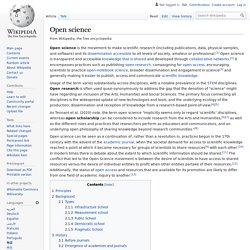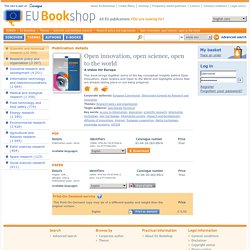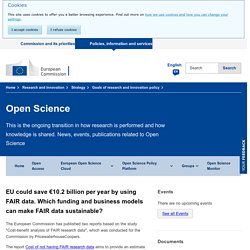

Open science. The six principles of open science[1] Open science is the movement to make scientific research (including publications, data, physical samples, and software) and its dissemination accessible to all levels of an inquiring society, amateur or professional.[2] Open science is transparent and accessible knowledge that is shared and developed through collaborative networks.[3] It encompasses practices such as publishing open research, campaigning for open access, encouraging scientists to practice open notebook science, and generally making it easier to publish and communicate scientific knowledge.

Background[edit] Science is broadly understood as collecting, analyzing, publishing, reanalyzing, critiquing, and reusing data. Offene Wissenschaft. EU Open innovation, open science, open to the world - Research policy and organisation. Publication details This book brings together some of the key conceptual insights behind Open Innovation, Open Science and Open to the World and highlights actions that are already taking place or are being prepared Corporate author(s): European Commission, Directorate-General for Research and Innovation.

Open Science - Research & Innovation. EU could save €10.2 billion per year by using FAIR data.

Which funding and business models can make FAIR data sustainable? The European Commission has published two reports based on the study "Cost-benefit analysis of FAIR research data", which was conducted for the Commission by PricewaterhouseCoopers. The report Cost of not having FAIR research data aims to provide an estimate for the EU economy based on a series of indicators extracted from previous studies and analysed via interviews with subject matter experts.
Using quantitative methodology and very conservative assumptions, the analysis shows that the minimum cost for the EU is €10.2 billion per year, which will increase over the years if we do not take action. The report Policy recommendations provides evidence to decision makers for setting up short- and long-term actions pertinent to the practical implementation of FAIR principles. Open Science and Research Handbook (FINLAND)